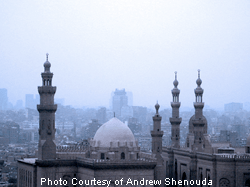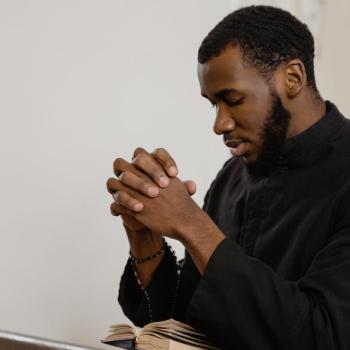 By Stephen Grand - May 31, 2009
By Stephen Grand - May 31, 2009
On June 4, President Obama will deliver his much-anticipated address to the "Muslim world" at Cairo University, fulfilling a pledge he made very early in his presidential campaign.
The speech is but the latest in a series of energetic efforts by the President to reach out to citizens of Muslim-majority states and communities and chart a new path in what since September 11, 2001, has often been a troubled relationship. In addressing the world's approximately 1.3 billion Muslims in such a public way, the President faces four difficult challenges that he will have to navigate with great care:
DIPLOMACY - The Palestinian issue is the "prism of pain" through which many Muslims view the United States, as my colleague Shibley Telhami has observed. Polling data suggests that citizens of Muslim-majority countries tend to like President Obama and want him to succeed, but they will judge him in significant measure by the seriousness with which he tackles the Palestinian-Israeli conflict. Benjamin Netanyahu was in Washington last week and Palestinian President Mahmoud Abbas paid a visit this week. Whether those meetings are seen to have yielded concrete progress toward restarting negotiations will color how many Muslims view the June 4 speech. In Cairo, Obama will need to explain what was accomplished in those meetings and how they fit with his vision of moving toward a final settlement of the conflict.
DEMOCRACY -After weighing many options, the White House probably settled on Cairo as the location for the speech because Egypt has long been the leading intellectual and cultural force, as well as the most populous country, in the Arab world. But the choice of Egypt as venue comes with a distinct negative: its poor record on democracy and human rights. Hosni Mubarak is in his fifth six-year term as Egypt's president, and his regime has beaten, locked up, and/or exiled most of his political opponents. On the surface, President Obama would appear to confront the agonizing choice of either insulting his host by raising these issues or be seen to be abandoning America's longstanding commitment to the promotion of democracy and human rights by not doing so, thereby disappointing the millions who will be listening carefully for any signs of a change in U.S. policy in the region. Some have suggested that the very risks associated with the setting, though, could provide the opening for a speech akin to his Philadelphia speech on race, where he can use the very delicacy of the topic to speak with candor about how both the United States and Muslim-majority states can do a better job of living up to the ideals of democracy and individual liberties.
What do you think?
Join the discussion on Obama's speech in Cairo.
DETAILS - President Obama has had nearly perfect pitch in the messages he has conveyed to date to the Muslim world. Because of his family's Muslim roots in Kenya and his experience living as a youth in Indonesia, he seems to understand intuitively what to say and how to say it, in a way that comes across as empathetic rather than bombastic. A challenge he faces, though, is getting beyond the soaring rhetoric to specifics. As with the Palestinian-Israeli conflict, Muslim audiences, as predisposed as they may be to him personally, are looking to see if his words will be backed up by actions. In his April speech to the Turkish parliament, Obama promised that he would "present specific programs" as to "what we can do, in partnership with people across the Muslim world, to advance our common hopes and our common dreams." In Cairo, he needs to begin laying out some of those specifics.
DEVELOPMENT - One way he can do that is by talking about how the United States can partner with the Muslim world to advance human development and help build knowledge societies. Even if President Obama were to miraculously resolve the Palestinian-Israeli conflict, withdraw American troops expeditiously from Iraq, defeat the Taliban in Afghanistan and Pakistan, and resolve the nuclear standoff with Iran, the United States would still confront grave challenges in the region. Foremost among these is the problem of poor governance in many Muslim-majority countries. In an era of globalization, many of these governments have been unable to deliver economic growth or provide basic services to their citizens. A recent Brookings Index of Weak States categorized 40 of the world's 48 Muslim-majority states as either "failed states" (2), "critically weak states" (8), "weak states" (11), or "states to watch" (19). The World Bank, in its ratings of governance performance (where countries are given a governance score ranging from -2.5 to +2.5), gave 38 of the 48 negative scores. This is the cause of much of the anger and frustration that extremists groups like Al Qaeda and the Taliban have capitalized upon. The surest way to create more accountable and effective governance over the long-term is to help upgrade human capital - to ensure that the region's next generation is better educated, more capable of thinking for themselves, and more capable of being engaged citizens and effective participants in the global economy.
In spite of these challenges, the upcoming speech presents a unique opportunity for President Obama to begin to change the dynamic in America's relationship with the Muslim world. Millions of Muslims will tune in to the speech in living rooms and coffee houses throughout the world. As he has so many times in the past, let's hope the president has the deftness and the rhetorical powers to begin to change the conversation America has been having with the world's 1.3 billion Muslims in a more productive direction.
Stephen Grand is the Director of the Project on U.S. Relations with the Islamic World at The Brookings Institution's Saban Center for Middle East Policy.
1/1/2000 5:00:00 AM




